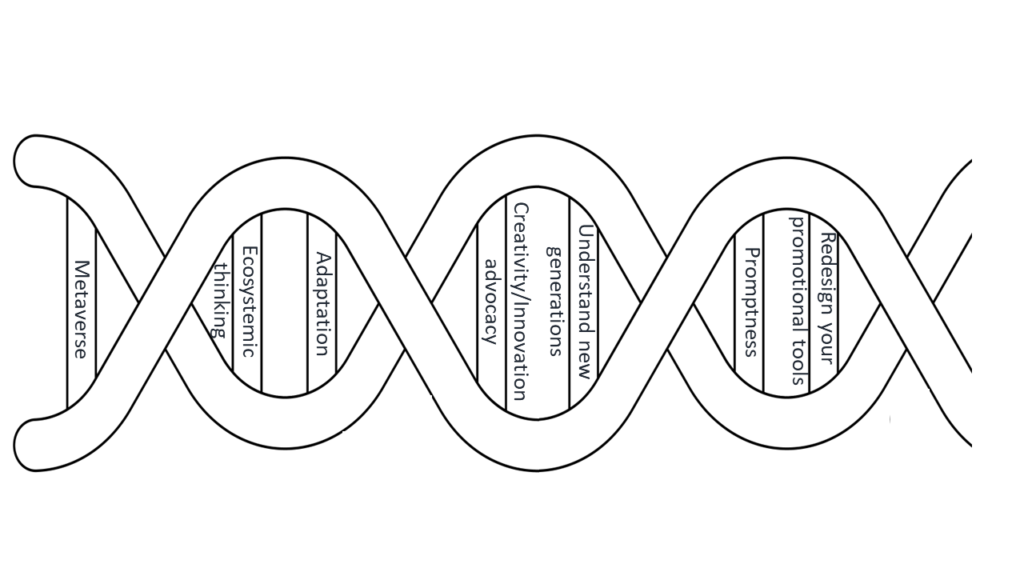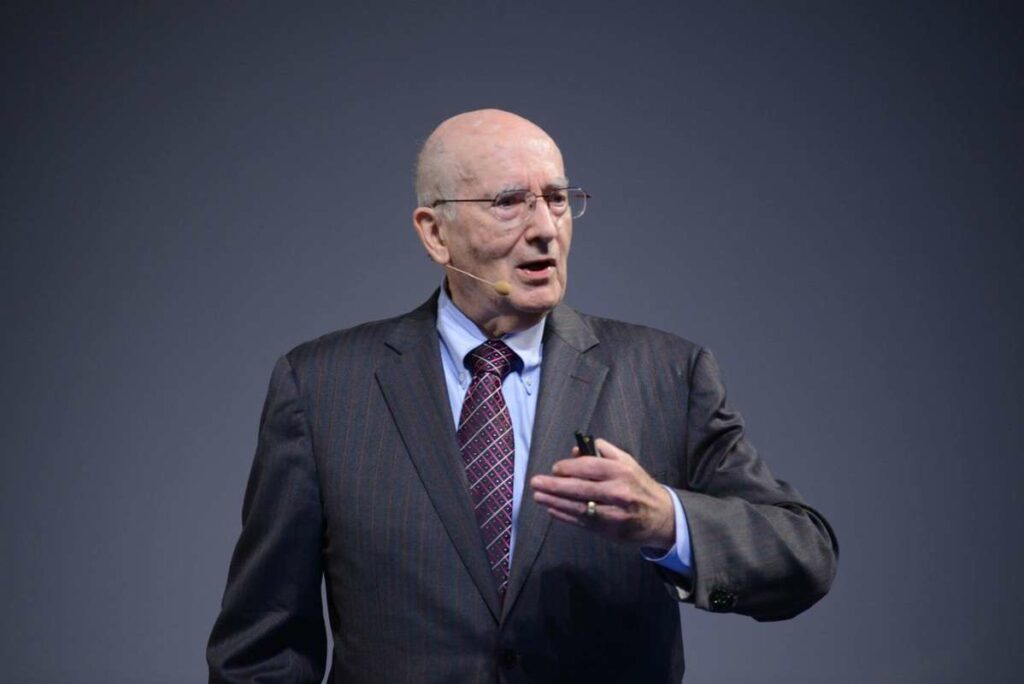
Philip Kotler (Social Media Marketing)
“IS THE DIGITAL REVOLUTION GOING TO CHANGE ENTREPRENEURIAL DNA?“
This interview looks at two of Philip Kotler’s most recent books, “Social Media Marketing” and “Entrepreneurial Marketing” from a Darwinian perspective. Is the new generation of entrepreneurs going to modify its genetic code in order to adapt to a changing communicational environment?
Philip Kotler is the S.C. Johnson & Son Distinguished Professor of International Marketing at the Northwestern University Kellogg Graduate School of Management in Chicago. He is hailed by Management Centre Europe as “the world’s foremost expert on the strategic practice of marketing.” Kotler is known to many as the author of what is widely recognized as the most authoritative textbook on marketing: Marketing Management, now in its 13th edition. He has also authored or co-authored dozens of leading books on marketing. Among his latest books:
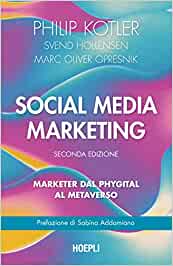
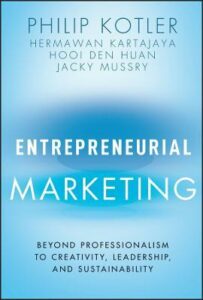

For further details – http://www.kotlermarketing.com/phil1.shtml
INTERVIEW – (April 2023)
This interview was made and published in April 2023 on www.lteconomy.org
Subject: Companies communication strategy in the digital era
By Dario Ruggiero, Founder of Long Term Economy
and Edoardo Magnotta, Senior Advisor at LEAD Ventures
Highlights
- Traditional promotional tools are still effective, but with diminishing importance. Companies have to redesign their promotional tools.
- In a digital world, the company needs tools to spot and quickly correct damaging information.
- With millennials and centennials becoming the next consumer target, companies need to deal with a new generation of values.
- Business environments have become much more dynamic. Be flexible, and innovative and inspire creativity.
- In a disruptive changing world, adaptation is the key.
- Companies that think of themselves as part of an ecosystem find profitability and save the world.
- The metaverse is the new frontier of marketing.
⇓
Change 1 | Redesign your promotional tools
The three most important promotional tools in traditional marketing are advertising, salesforce and price. All three are still effective but of diminishing impact. Consumers get their information about products and services in so many new non-traditional ways. Consumers can read blogs, listen to podcasts, and interact on social media networks such as Facebook, Google, and other platforms. Start-up marketers use blogs to build a community of listeners. They create podcasts describing interesting aspects of their industry, company or product. They pay Facebook and other social medium platforms to advertise their messages.
In using multiple media, marketers must aim for consistency. The starting point is their value proposition and brand. All of Starbucks messages must celebrate their quality and variety.
Traditional advertising still must play a role in the promotion mix. Most consumers still read newspapers and magazines, listen to the radio, watch television, and view billboards in addition to the Internet. Companies need to watch which traditional media are still strong and which are weakening and readjust their budgets accordingly.
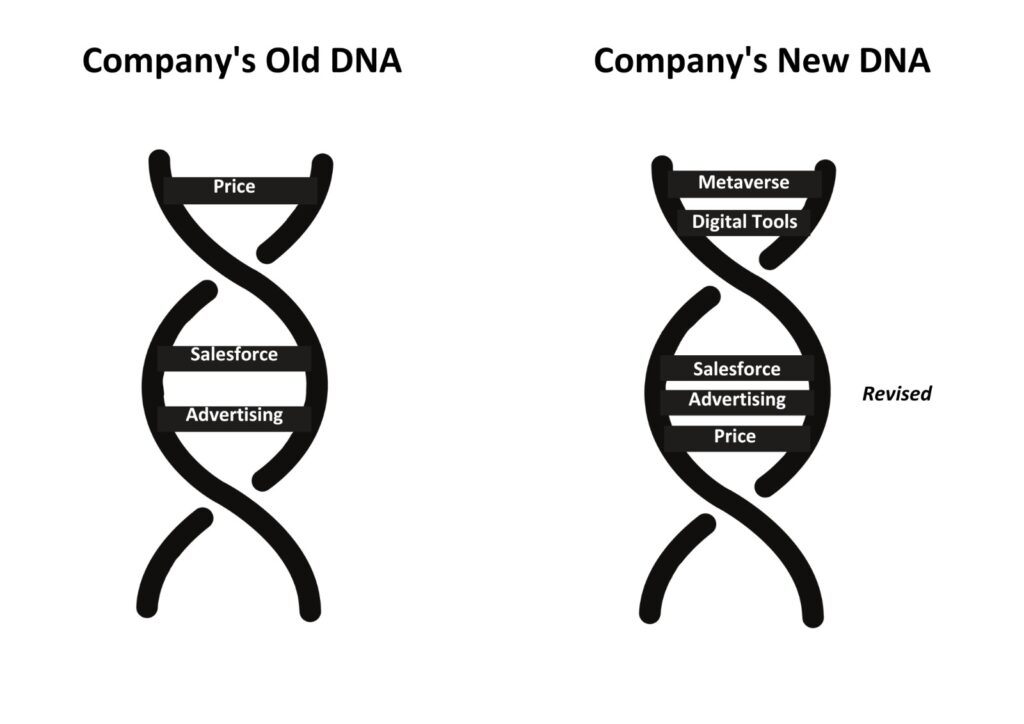
⇓
Change 2 | Quickly correct damaging information
In a digital world influencers and customers can express and spread their opinions more easily. Is the gap between “what a company does” and “what it communicates” becoming thinner? In which way is it affecting the company’s overall strategy and marketing approach?
“In a digitalized world
the company has only a limited control of all the forces shaping its image”
⇓
Change 3 | Deal with a new generation of values
“Companies need a deep understanding of the attitudes and
preferences of younger generations such as millennials and generation y”
Change 4 | Think more broadly about your ecosystem and value chain. Create, innovate, and find solutions
The point we make in our new book Entrepreneurial Marketing is that “professional marketing” isn’t enough. Most professionals focus on selling as much as they can of their existing products and services. Their work is characterized by following “procedures” and “norms.”
We believe that firms need to add some entrepreneurial marketers who think more broadly about the company’s ecosystem and value chain. These entrepreneurs recognize that fast change is coming into every business and industry that destroys some old practices and calls for new practices. Entrepreneurs come up with new ideas, some of which might undergo innovation, and result in new solutions to customer problems. The CEO must encourage creativity, innovation, and solution-finding. Consider that Google tells its employees that they can spend 20% of their time thinking up new things that Google could do. This policy resulted in Google launching Gmail, Google Maps, and Ad Sense.
“Most professionals focus on selling as much as they can of their existing products
and services. Their work is characterized by following ‘procedures’ and ‘norms’ ”
⇓
Change 5 | Adapt, adapt, adapt!
There are two types of companies. One type continues its policies and strategies as if the world has remained essentially the same. The company believes that its success depends on the same formula that brought its success. The other type believes that change is coming fast and furiously and that it must reinvent its business. This type will digitalize its business and inspire its people to come up with new ideas.
The evidence of businesses failing in response to significant changes is overwhelming. Of Fortune’s 500 companies in 1955, only 60 companies still exist in 2017. These companies did not adapt. Admittedly, adapting always carries risks. But the risk of not adapting is the bigger risk.
“Adapting always carries risks. But the risk of not adapting is the bigger risk”
⇓
Change 6 | Think of yourself as part of an ecosystem!
Every company is part of an ecosystem. Coca Cola depends critically on water supply. If our oceans get filled with plastics and the water become undrinkable, Coca Cola is hurt. If Coca Cola continues to supply Coke in single-use bottles that end up in huge scrap heaps, consumers might want to drink less Coke and drink more water. Imagine the gain for consumers if Coke could supply them with a powder for making their own Coke at home without the need to ship bottles and water around the world.
Walmart provides an excellent example of ecosystem thinking. Walmart found that many suppliers delivered their goods using trucks with high fuel expenses. Walmart was paying higher prices for its supplies as a result. Walmart issued the order to its suppliers to buy and use new trucks with a lower fuel cost for the benefit of everyone. My belief is that every company will ultimately find savings in turning to a sustainability mindset. Sustainability practices would improve profits and save the planet.
“Every company will ultimately find savings
in turning to a sustainability mindset”
⇓
Change 7 | Use metaverse as a market simulation
Finally, “From Phygital to Metaverse”. This is the subheading of your book “Social Media Marketing”. Is Metaverse going to be the next evolutive step of companies?
The Metaverse has many meanings. Facebook changed its name to Meta in the belief that new virtual markets would be created. The word “meta” means “beyond”. Metaverse is an extra 3D layer on the traditional 2D internet. It is a 3D world where business, information, and communication tools operate. The users can come together as avatars and they can interact with each other. They can buy land in the metaverse, build a factory, office, or home, and transact. The metaverse can serve as a laboratory for experimenting with new market concepts. If many avatars vote positively on a virtual market offering, the proposing company feels easier about making it.
The Metaverse already exists in virtual gaming through online worlds like Fortnite or Roblox. Altogether new industries, marketplaces and resources will be created to enable this future. Adidas has deployed virtual reality (VR) to let shoppers virtually try on shoes. Ikea has been integrating it for years to let people visualize furniture in their own homes. I believe that more companies will use the idea of the metaverse to explore and test new offerings and new market worlds.
“The metaverse can serve as a laboratory
for experimenting with new market concepts”
